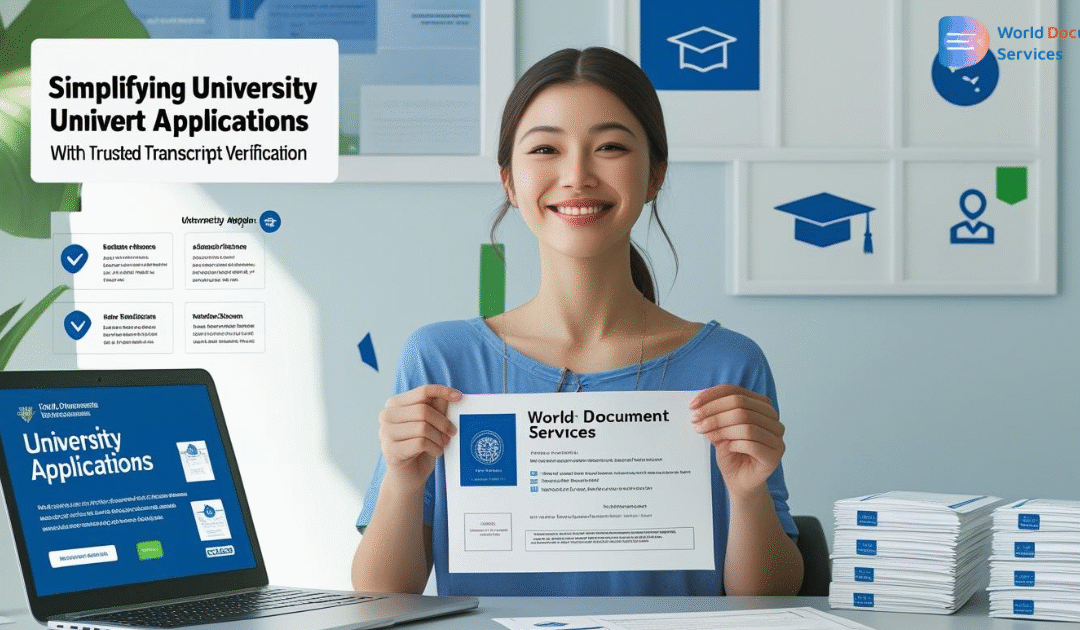
by World Document Services | Aug 27, 2025 | Transcripts Services
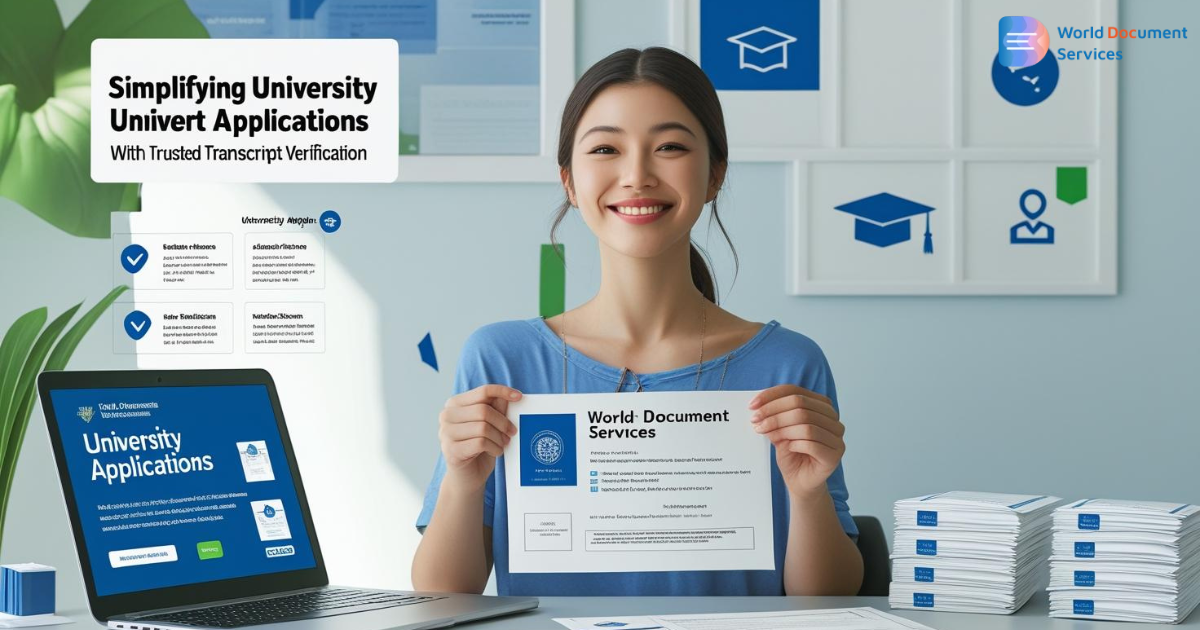
University application is overwhelming, particularly during the submission of official academic documents. Probably one of the most significant aspects of any university application is proving qualifications by sending in verified copies of academic transcripts. The procedure, however, becomes hectic and stressful if left in your hands to do on your own. That is precisely where World Document Services stands tall. As a trusted provider of transcript verification services, World Document Services ensures that your academic documents are authenticated, accurate, and submitted on time.
Need help with your Transcript Verification Services? Contact Us Now!
How can we help you get your transcript stress-free??
Getting your transcript on your own is a hassle, whereas we help you get your documents without a delay or hurdle, as well as authenticate your documents.
In this article, we’ll explore eight ways World Document Services simplifies university applications through professional transcript verification.
1. Authenticates Academic Documents
Universities need the copies to be verified for them to validate your academic record. World Document Services does direct liaison with the educational institution to verify your transcripts so that universities get original and authentic documents from the service.
Applicants can have the confidence that their academic record is accepted and trusted by universities worldwide when they submit applications through a professional verification service such as World Document Services.
2. Saves Time with Efficient Processing
Manual handling of verification of transcripts usually involves contacting universities, paperwork, and delays. World Document Services simplifies all the verification process steps from gathering documents to making submissions.
They have an efficient system that eliminates delay and ensures speedy processing of your transcripts, so you can focus more on other components of your application.
3. Avoids documentation errors
Academic documents, such as misspelt names, incorrect grades, or missing information, can delay the application process significantly. World Document Services reviews and verifies your documents to ensure they are accurate and complete.
Their expert team checks for inconsistencies and corrects errors before submission, reducing the risk of application rejection due to document mistakes.
4. Expert Handling of International Applications
International applications usually demand much complexity, such as translation of documents, proper formatting, and specific verification standards. World Document Services specializes in academic transcript verification for students seeking admission to foreign universities.
They are aware of international academic standards and ensure that your transcripts are formatted, verified, and submitted according to the requirements of the universities across countries like the US, Canada, the U.K., and Australia.
5. Direct Submission to Universities
Many colleges demand that the verification of transcripts be done directly by the issuing college or a licensed verification service. World Document Services has established partnerships with colleges all over the globe, so it can send your authenticated transcripts directly to the admission offices.
It not only speeds up the process but also allows universities to know that your documents are official and tamper-proof.
6. Secure and Confidential Document Handling
Security and confidentiality are very important when dealing with sensitive academic documents. World Document Services uses secure systems and encrypted channels to manage your transcripts and other academic records.
Their secure processes ensure that your personal information and documents are protected from unauthorized access, providing peace of mind throughout the verification process.
7. Real-Time Tracking of Verification Progress
This is very distressing when deadlines are near. World Document Services will offer you live tracking of the status of your transcript verification at every detail.
Using frequent updates and notifications, you will never miss time whenever your papers have been processed and delivered, keeping you free from tension and fulfilling your application requirements.
8. Faster Turnaround for Timely Admissions
Missing deadlines for filing or submission are caused by delays in transcript verification. World Document Services processes transcripts fast and with reliability so that your verified transcripts reach the universities before the respective submission deadlines.
Prioritizing urgent requests and streamlining their workflows, they help applicants meet tight deadlines and hence improve chances of getting on-time admission.
Why Choose World Document Services for Transcripts?
World Document Services stands out as the leader in professional transcript verification services due to reliability, efficiency, and global reach. They provide:
- Global expertise in handling both domestic and international applications.
- Error-free documentation through meticulous review and verification.
- Secure processes that protect your sensitive academic data.
- Direct submissions to universities for faster and more credible processing.
Whether it is at the university application, scholarship programs, or visa immigration level, World Document Services streamlines these processes and safeguards your academic documentation with professional assistance.
Conclusion
Submitting verified academic transcripts is a critical step in the university application process. By partnering with World Document Services, you can eliminate the stress of managing document verification on your own. Their professional handling of academic transcript verification ensures authenticity, accuracy, and timely submission to universities around the world.
From authenticating documents to submitting directly to the university, World Document Services has all these comprehensive solutions for saving time and avoiding errors. With a good, reliable service such as World Document Services, it’s a sound investment in one’s academic future.
Download the World Document Services App.
You may enjoy a hassle-free experience by downloading our mobile app from either the App Store or the Play Store. It works with both iOS and Android devices.
Frequently Asked Questions (FAQs)
Q: What do World Document Services do?
A: World Document Services provides professional transcript verification services by authenticating academic documents and submitting them directly to universities and institutions.
Q: How does World Document Services ensure document security?
A: They use encrypted systems and secure channels to handle and transmit sensitive academic documents, ensuring complete confidentiality and protection.
Q: Can World Document Services help with international university applications?
A: Yes, they specialize in checking and submitting academic transcript verification for global universities, that is, standard compliance.
Q: How long does the process take?
A: Process times vary. However, World Document Services excels at faster and more efficient processes to meet short deadlines.
Q: Does World Document Services direct transcripts to the university?
A: Yes. They have associations with universities whereby they can post verified transcripts to admissions offices that meet institutional standards.
Q: What documents can World Document Services verify?
A: They verify academic transcripts, degree certificates, and other educational documents that are required for university admissions and professional assessments.
Q: Is it worth using World Document Services for transcript verification?
A: Absolutely! Their expertise, security, and efficient processing significantly reduce the risk of delays and improve your chances of successful admission.
With World Document Services, you take the very first step to simplify your university application process while making sure your academic documents are verified professionally and submitted.
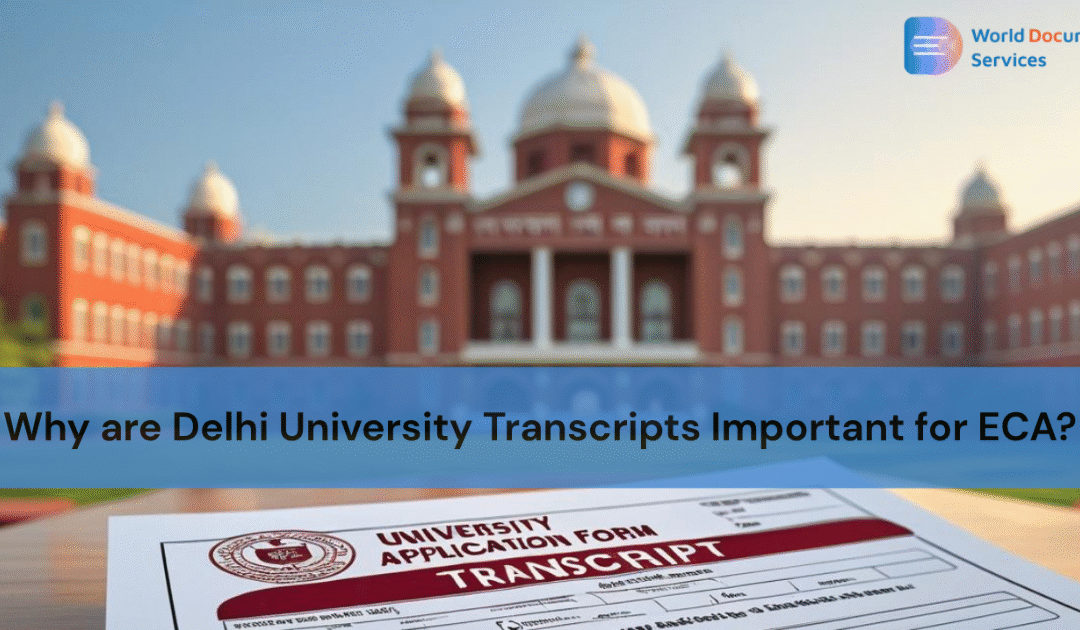
by World Document Services | Aug 18, 2025 | Transcripts from University
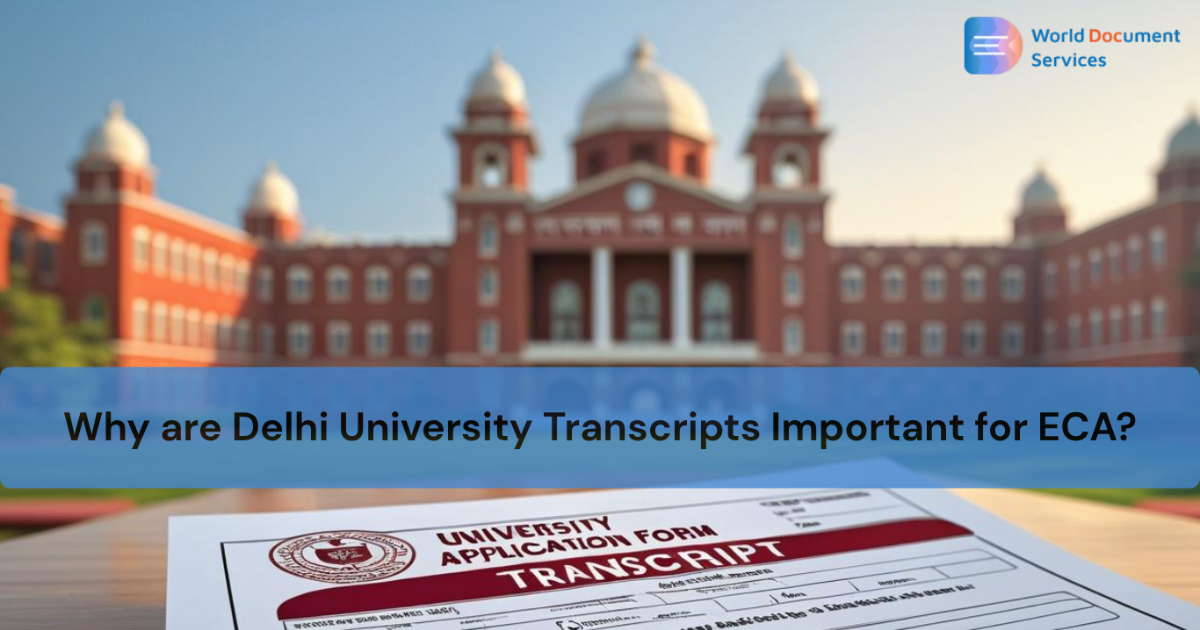
Acquiring higher education or professional prospects abroad involves serious scrutiny of one’s academic credentials. One of the most important steps in the process is obtaining and submitting official transcripts for the Educational Credential Assessment. Official, verified transcripts are important to graduates from Delhi University (DU) so that their credentials can be recognized abroad.
This article elaborates on the importance of Delhi University transcripts to ECA, the role that it plays in the evaluation process, and how World Document Services can make this vital step simpler and more streamlined.
Need help with your Delhi University Transcripts? Contact Us Now!
What is educational credential assessment?
An ECA is an official evaluation comparing your foreign educational credentials with those of another country, like Canada, the USA, or Australia. Such evaluation is sometimes mandatory for immigration purposes, professional licensing, or entry into higher education in other countries.
Major organizations like World Education Services (WES), International Credential Assessment Service of Canada (ICAS), and International Qualifications Assessment Service (IQAS) conduct evaluations. A successful ECA ensures that your qualifications will be recognised and accepted internationally.
Delhi University graduates should provide DU academic transcripts for proper evaluation and verification of their academic qualifications.
Why are Delhi University transcripts important to ECA?
1. Evidence of Academic Qualification
Delhi University transcripts are official documents of your academic qualifications. The transcripts contain a proper outlining of your coursework, grades, and the degree granted. For this reason, authorities in charge of ECA must verify such documents to determine the comparability of qualifications for the host country.
2. Compulsory for ECA assessments
Official transcripts are mandated, sealed at the issuing institution, and mailed directly from the institution or an authorized verification service when evaluating an organization for ECA. Without verifiable transcripts, your ECA application might be delayed or rejected.
3. Efficient Immigration Process
Applying to Canada’s Express Entry immigration program requires submitting a valid ECA report. Indeed, verified DU transcripts for educational credential assessment ensure that your qualifications undergo proper evaluation, thus pushing through to successful immigration.
4. Prevents Errors That Are Causing Delays
Transcript errors, incomplete records, wrong grades, or missing semesters may cause delays or even trigger rejections during the ECA process. Delhi University official transcripts will have complete, accurate, verified academic information that meets international standards of evaluation.
5. Accepted by International Organizations and Employers
Many international universities and employers recognize DU transcripts in credential evaluation as authentic and credible records of academic performance. Verified transcripts will improve your credibility and increase the chances of getting accepted or employed.
How World Document Services Streamlines Delhi University ECA Process
The ECA process at Delhi University can be very cumbersome, especially in the matter of getting official transcripts to ensure they reach the respective ECA bodies in time. World Document Services specializes in handling Delhi University transcripts for ECA; thus, it offers an end-to-end, hassle-free, and efficient process.
1. Comprehensive Transcript Solutions
This also maintains the process regarding the acquisition of your DU academic transcripts for verification by World Document Services. With the required paper materials, from preparing them to applying at ECA offices, the full process is completely taken care of.
2. Direct Application Process Through ECA Entities
ECA organizations mandate that transcripts should be sent directly from the university or through an authorized verification provider. World Document Services ensures that your verified transcripts are submitted directly and securely to WES, IQAS, ICAS, or any other credential evaluation authority.
3. Error-Free Documentation
Incomplete or incorrect documents can delay ECA evaluations. World Document Services carefully reviews your academic records, corrects errors, and ensures all documents meet the ECA requirements.
4. Safe and Confidential Processing
Processing sensitive academic documents requires security. World Document Services offers secure systems for processing your Delhi University transcripts so that your data cannot be accessed without permission.
5. Quick and On-Time Processing
Transcript submission may delay your immigration or admission deadlines. World Document Services places a premium on on-time processing so that the transcripts reach the ECA bodies before the deadlines.
6. Real-Time Tracking and Updates
Real-time tracking keeps you updated on each step of the process. You also receive updates from World Document Services about the status of your transcript processing and submission. This brings about peace of mind.
Convenience Through Our Mobile App
To make it more convenient for you, we at World Document Services have offered a mobile application through which a user can have access to their transcript verification and ECA process. With our mobile application, you can: upload your transcripts securely; monitor the status of your transcript submission in real-time; receive automatic updates and instant notifications; and receive special support to address all of your queries.
You can have a smooth experience if you download our mobile application available on the App Store and the Google Play Store. It supports both iOS and Android applications.
Download from the Google Play Store
Download from the App Store
Frequently Asked Questions (FAQs)
Q: Why do I need Delhi University transcripts for ECA?
A: Official transcripts by ECA bodies are required to validate your qualifications and compare them with international standards of education.
Q: Will World Document Services send my DU transcripts to WES?
A: World Document Services sends your authenticated Delhi University transcripts to WES, as well as other ECA bodies, safely.
Q: How long does the verification process take for transcripts?
A: The processing time will vary, but World Document Services ensures that services are fast and efficient in keeping up with close ECA timelines.
Q: Are my documents safe with World Document Services?
A: Absolutely. World Document Services has secure systems to protect all your academic records and personal information during the verification process.
Q: How do I follow up on my transcript submission?
A: Yes! The World Document Services mobile app keeps you updated about the status of your transcript submission in real time.
Conclusion
Getting and submitting authenticated Delhi University transcripts is an essential step to acquiring a successful ECA. It proves your academic achievements and can be required in the process of university admissions, immigration, or professional licensing overseas.
This would be a simplification of such a complicated process, as it handles the entire verification and submission process of your DU academic transcripts for ECA. Their service is secure, efficient, and professional, ensuring that all your transcripts reach the ECA organizations accurately and authentically and are delivered on time.
Download the World Document Services mobile app now and make your ECA experience less of a hassle and convenient. Let World Document Services handle your transcript verification, so you can focus on your future!
Download the World Document Services App.
You may enjoy a hassle-free experience by downloading our mobile app from either the App Store or the Play Store. It works with both iOS and Android devices.
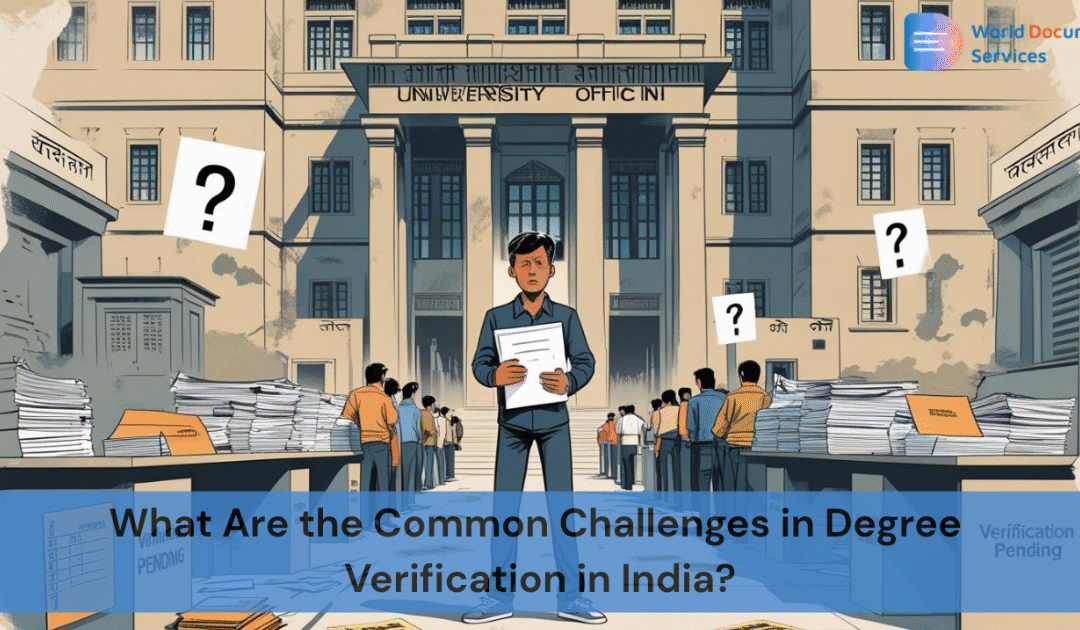
by World Document Services | Aug 11, 2025 | Document Verification
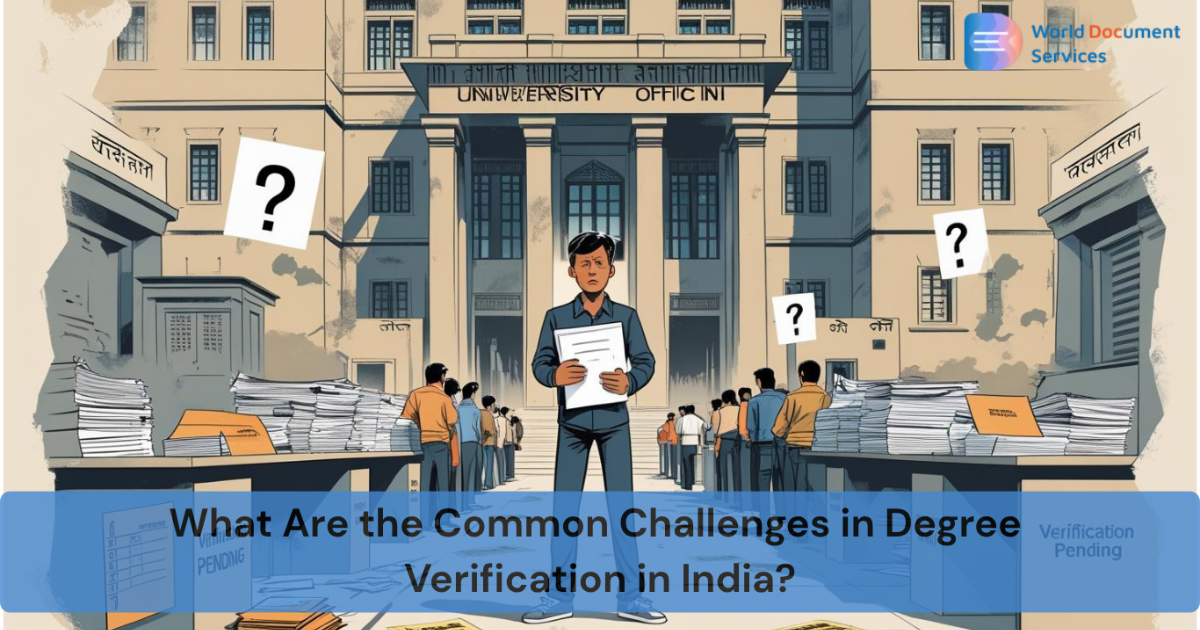
Degree verification is an important process in matters of migration, whether for employment or educational purposes. This is a lengthy process that involves multiple steps, starting from contacting the university to getting the entire process sorted, concluding it by getting your degree verified. However, this process is lengthy, has its own challenges, and creates many issues such as inaccuracies, errors, and delays, which often are a trouble to the applicant.
Need help with your Degree Verification? Contact Us Now!
1. Lack of a Centralized Degree Verification System
One of the biggest challenges in India is the absence of a centralized record system for academic credentials. With thousands of universities and colleges maintaining separate records, accessing verification data becomes cumbersome. Unlike some developed nations with unified academic databases, India’s fragmented system causes delays and inefficiencies. Establishing a centralized database would streamline the verification process, making it more efficient and accessible.
2. Manual and Paper-Based Processes
Many universities in India are still functioning on traditional paper-based record-keeping of documents or maintaining the records, which is now pretty outdated as well as less reliable. Keeping an outdated working pattern slows down the entire verification process, making it less reliable and error-free. Having a paper-based record increases the chances of misplacement and errors in the records.
3. Inconsistent Verification Procedures
The degree verification process varies and differs entirely from university to university. Some institutes have a traditional way of bookkeeping, while others have a modern one. Some universities do not have a predefined process for a degree; some have methods that one can follow and obtain. This inconsistency leads to delay, and only proper planning can help you avoid this delay.
4. Delays in Response from Universities
A common issue in academic credential verification is the prolonged response time from universities. Due to multiple drawbacks and inefficiencies, understaffed departments, and administrative bottlenecks, it can take weeks or even months to process verification requests. These delays can negatively impact job opportunities, admission timelines, and visa applications.
5. Forgery and Fraudulent Degrees
Fake degree certificates and fraudulent academic claims are widespread in India. Many individuals attempt to avoid verification by presenting fraudulent documents. This has made it essential for organizations to implement a strict degree verification process. Figuring out the genuine credentials from fraudulent ones still remains a challenge, especially when universities lack a transparent and uniform verification system.
6. Limited Digital Infrastructure
Some universities, along with time, have developed and started to maintain the digital verification method, while others are still enticed by the traditional paperback method of verification. In the absence of digital methods and uniform methods, many individuals are forced to rely upon postal communication, which is also inefficient and makes the entire process a hassle.
7. High Verification Costs
The cost of verification again is similarly a barrier for individuals and organizations, as these universities have varied and scattered fee systems. Some institutes charge the fees for verification along with the application of transcripts, while others consider it an individual cost. The verified degree to be sent to a domestic address or to an international employer is also a point where the cost will differ.
8. Complexity in Verifying Foreign Degrees
For Indian students who have studied abroad, verifying foreign degrees can be even more complicated.
Validation from international institutes for the student who has followed the Indian educational system. Lacking a uniform system makes the entire process lengthy and creates a long waiting list and waiting periods.
9. Limited Awareness and Guidance
Many students and professionals planning to move abroad and are planning to pursue their career ahead are unaware of the fact that there’s a step, such as degree verification. A lack of such information makes it difficult for one to understand the correct degree verification process and struggle to find the right one as well. Unclear guidelines from the university make it difficult for one to obtain the documents verified on time, as well as make the process complicated.
10. Data Privacy and Security Concerns
With increasing digitization, data security is a major concern in academic credential verification. Universities and verification agencies must ensure that personal and educational data are protected from cyber threats and unauthorized access. The risk of data breaches or misuse of sensitive academic records discourages institutions from fully adopting digital verification methods.
Solutions to Improve the Degree Verification Process in India
While challenges persist, several measures can enhance and streamline the degree verification process:
- Centralized Database: A common database for academic records would simplify verification and reduce inconsistencies.
- Digital verification methods: Universities must start to use blockchain-based verification systems to enhance efficiency and reduce fraud.
- Verification Procedures: Establishing a uniform verification process across all universities will create transparency and accessibility.
- Automation and AI Integration: Leveraging AI-driven verification tools can help detect fake degrees and speed up the record retrieval process.
- Awareness Campaigns: Educating students and employers on the correct verification procedures can reduce errors and miscommunication.
How World Document Services Can Help
For individuals and organizations looking for a streamlined verification process, professional degree verification services can be highly beneficial. We at World Document Services help you in obtaining and verifying academic credentials efficiently, minimizing delays and ensuring authenticity with reliability. With expertise in handling verification requests, we help navigate the complex procedures and provide reliable solutions for academic record verification.
Download the World Document Services App.
You may enjoy a hassle-free experience by downloading our mobile app from either the App Store or the Play Store. It works with both iOS and Android devices.
Conclusion
Degree verification in India is a complex process with multiple challenges, including inconsistent procedures, delays, high costs, and fraudulent degrees. While steps are being taken to improve the system, more effort is required to standardize and digitalize the verification process. By adopting centralized, secure, and efficient verification methods, India can enhance the credibility of its education system and facilitate smoother verification for individuals and organizations alike.
FAQ:
Q: Why is degree verification important?
A: It helps the employees and educational institutions to ensure that the documents submitted by the individual are authentic and are shared by the university itself.
Q: How long does the degree verification process take in India?
A: It varies depending on the university. If the documents submitted are correct, it can take weeks or months to years if there are any errors.
Q: How can I verify my degree from an Indian university?
A: Both online and offline models are available. But if you are present in the same city as your university, it is suggested that you visit and attempt to get verified.
Q: What are the costs associated with degree verification?
A: Cost entirely depends on the number of copies applied. Mode of application, i.e., online or offline, expedited or normal. The cost may vary as per your requirements.
Q: Can fake degrees be detected?
A: Yes, rigorous verification processes can help identify fraudulent degrees.
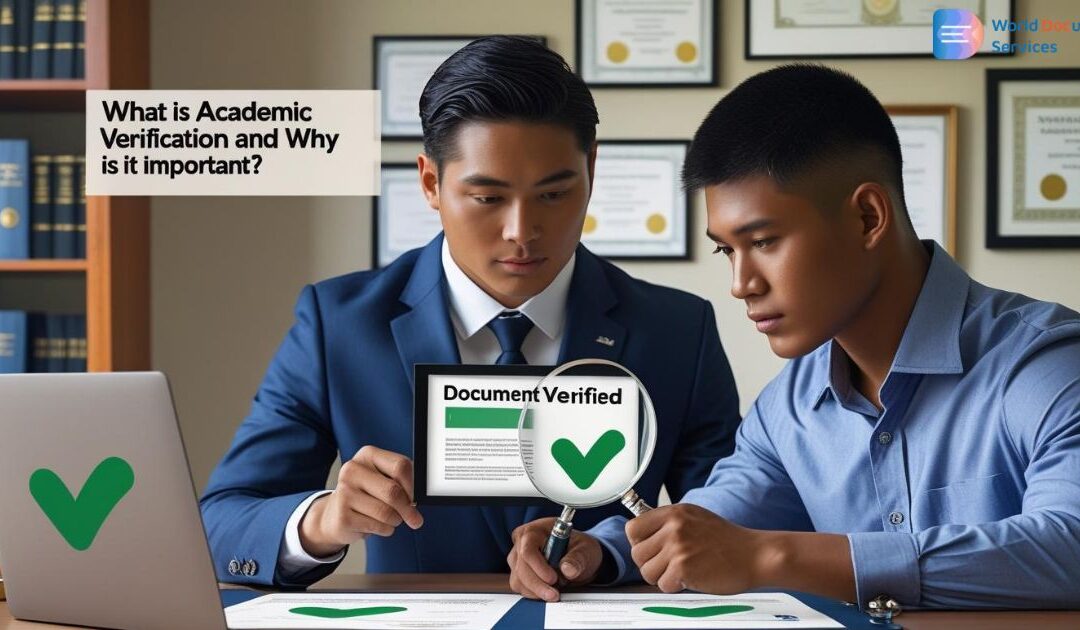
by World Document Services | Aug 11, 2025 | Transcripts Services
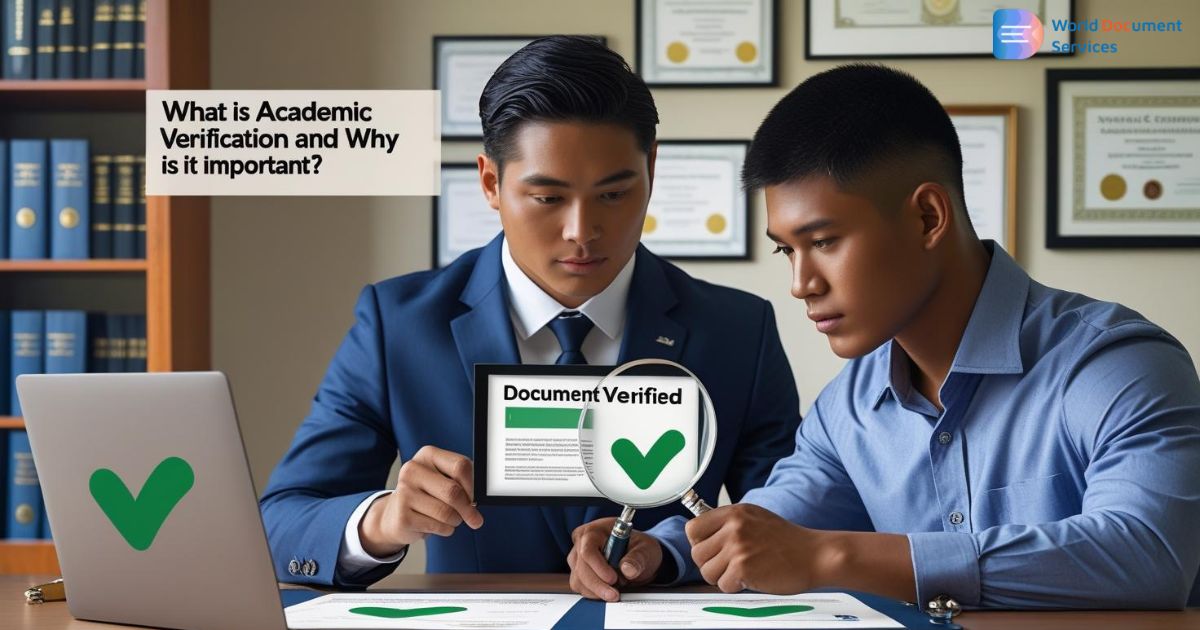
In the academic and professional worlds today, verifying educational qualifications becomes more critical. It could be for higher education, scholarship schemes, or an employment opportunity where the authenticity of academic records would be crucial. Here, it is important that academic verification plays a pivotal role. Academic verification is a procedure that verifies an individual’s legitimate educational qualifications, including degrees, diplomas, or transcripts.
World Document Services is the world’s largest and most prominent academic document verification service. They streamline the process to ensure your academic credentials are accurate, authentic, and recognized by educational institutions and employers across the globe.
Need help with your Academic Verification Process? Contact Us Now!
What is academic verification?
Academic verification is a process in which the academic credentials of an individual are verified with the issuing academic institution. It is ensured that the academic documents—such as transcripts, diplomas, and certificates—are authentic and correctly represent the academic achievements of the individual.
This step usually includes:
- Authentication of Degree: Verifying that the degree or certificate was indeed awarded legitimately.
- Verification of Course Completion: Ascertaining that the courses mentioned were completed.
- Cross-verification of marks or grades: ensuring that the grades or marks provided are accurate.
Sometimes, this verification is necessary between employers, universities, or immigration authorities to avoid false claims and ensure applicants meet certain qualification requirements.
Why is Academic Verification So Important?
1. Helps in avoiding fraud related to academic qualifications
As there is an increased level of fraudulent academic documents, the learning institutions and employers are cautious. Verification of academic credentials ensures that the applicants present original and legitimate qualifications. This protects the organizations from employing or admitting individuals with forged qualifications.
2. Trust and credibility are built
Verified academic credentials build trust between the applicant and the organization. Be it applying for a job, admission to a university program, or a visa, presenting verified academic credentials is proof of one’s credibility and professionalism.
3. Facilitates Admission to Universities
Most universities are very strict in admitting students by first confirming academic credibility, and thus, verification of academic records is recommended. Verifying academic records helps an institution determine if the applicant meets the set academic requirements for a certain program.
4. Visa, Immigration, etc., for a Move Abroad
For students or professionals seeking a move abroad, it often requires verified academic records for immigration, visa processing, or international admissions. Academic document verification ensures your qualifications are valid and recognized globally.
5. Employment
Specialized industries like healthcare, engineering, and law require proof of educational qualifications. Verified academic records ensure that candidates have the right credentials for their jobs.
6. Professional Licensing and Certifications
Many professional bodies only issue licenses or certifications after verifying your academic documents. World Document Services verifies your credentials, thus opening the doors to professional qualifications.
7. Scholarship and Financial Aid Applications
It facilitates scholarship and financial aid applications. There is verification of academic excellence before disbursing financial aid. Verified academic documents are proof of such academic achievements that increase the chances of getting funded.
How World Document Services Simplifies Academic Verification
World Document Services is a well-trusted company dealing in all academic verifications. It facilitates the verification of educational qualifications for individuals and organizations in a proper and efficient way. Its services include the following:
International Academic Verification
World Document Services collaborates with universities and educational institutions worldwide in the verification of academic records to be used locally and internationally.
Safe Handling of Documents
Security is paramount. World Document Services employs secure, encrypted systems in handling sensitive academic documents to ensure confidentiality and data protection in the verification process.
Zero Error Verification
Their professional team checks and verifies your documents thoroughly, reducing errors and ensuring that your records are accurate and complete.
Direct Delivery to Institutions
Most institutions require that these transcripts and certificates be sent directly. World Document Services delivers your documents straight and safely to the intended educational institutions.
Real-time Tracking
World Document Services follows up on the verification of documents in real-time. You find out at each stage, with the confidence you’ll get from their process.
Rapid and Prompt Service
World Document Services is keeping up with expediting the timely processing of certified documents well ahead of submission deadlines.
Accessible Academic Verification: On-the-go Convenience
It becomes even much easier with easy access to World Document Services—through a conveniently downloadable mobile application on iOS as well as an Android device through which you would be able to upload your academic record for verification through our services quickly, track what is happening every step of the way, and get instant notifications and updates.
- Have access to any questions or issues.
You can download the mobile application from the App Store or the Google Play Store and have a smooth experience. It is available for Android as well as iOS devices.
FAQs
Q: What is academic verification?
A: It is the procedure of verifying the authenticity of educational qualifications, like degrees, transcripts, and certificates, with the issuing institution.
Q: Why is academic verification important for university applications?
A: It ensures that your qualifications are authentic and meet the eligibility criteria for university admissions, reducing the risk of fraudulent claims.
Q: How does World Document Services verify academic records?
A: World Document Services contacts the issuing institutions directly to verify the authenticity of your academic credentials and guarantees that documents are processed and submitted securely.
Q: Can I track my verification status?
A: Yes. You can always check on your document verification in real-time with World Document Services by using their mobile app.
Q: Is my verification secure?
A: Absolutely. Through encrypted systems, World Document Services ensures the safeguarding of sensitive academic information about you at each point during verification.
Q: How long will it take for my academics to be verified?
A: Well, there’s a time-to-process variable here, but at World Document Services, the efficiency and prompt verification will be undertaken to ensure one meets critical deadlines in time.
Q: Is World Document Services able to aid in international applications?
A: Yes. They can validate academic documents from both the higher education sectors locally and the requirements of a given university or immigration abroad.
Conclusion
Academic verification refers to the authenticity test of qualifications undertaken in higher learning, employment, or international application processes. This authenticates that credential fraud may not creep through to any particular institution and/or employer as there is a due requirement.
World Document Services makes it easy with safe, accurate, and efficient academic document verification solutions that range from global verification to secure document handling and real-time tracking.
Download the World Document Services App.
You may enjoy a hassle-free experience by downloading our mobile app from either the App Store or the Play Store. It works with both iOS and Android devices.
Let World Document Services ease your academic journey and make it much more secure!
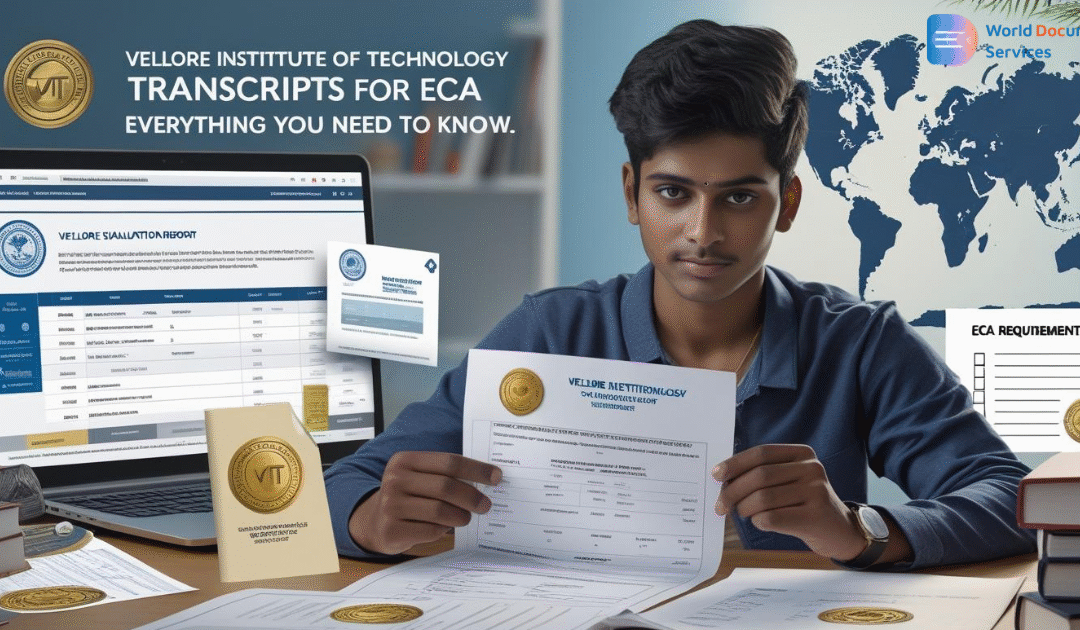
by World Document Services | Aug 8, 2025 | Most Viewed, Transcripts from University
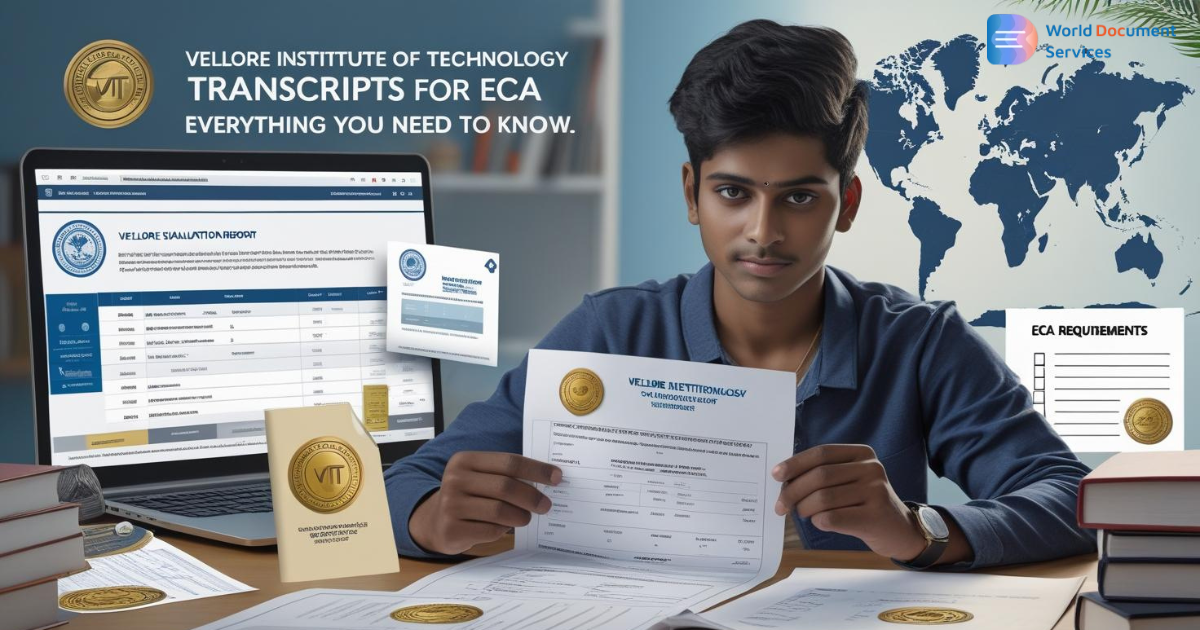
It is also necessary to obtain your official transcripts from the university when you are planning to study, work or migrate abroad. This guide will be helpful to you if you are an alumnus of Vellore University and planning for any of the above.
Need help with your Vellore University Transcript? Contact Us Now!
What Are Academic Transcripts?
To begin with, we need to understand what an academic transcript is. An academic transcript is a summary of your educational documents that mentions all the details required by the employer or the institute to verify your academic status. It has all the required details for the person to evaluate your profile, like your course undertaken, the time taken to complete the course, and your marks scored.
What transcripts are needed from Vellore University?
Vellore University’s transcript is recognized globally as it is regarded highly for its educational standards. If you are a graduate of this prestigious institution, obtaining transcripts:
- Apply for Educational Credential Assessments (ECA): Required for immigration processes such as Canada’s Express Entry and verifies that your degree meets international standards.
- Secure Admissions to Foreign Universities: Universities abroad need your transcripts to check your eligibility.
- Enhance Job Prospects: Employers may require proof of your educational background.
How to Apply for Vellore University Transcripts Online
Vellore University has streamlined its process for issuing transcripts. Here’s a step-by-step guide:
- Visit the official university website: Navigate to the transcripts or student services section.
- Fill out the application form: Fill out all the required details, such as your enrollment number, course details, and year of graduation.
- Attached are the required documents: Degree certificates, mark sheets, and ID proof.
- Pay the Fees: Payment can typically be made online through secure channels.
- Submit Your Application: When your application is complete, submit it online or in person, depending on the university’s procedure.
- Track Your Application: Most universities provide a tracking system for your transcript request.
Understanding the Role of ECA in Immigration
Educational credential assessments are the most important for any individual who has plans of pursuing opportunities abroad. Organizations like WES evaluate your transcripts and determine the equivalency of your degree. Transcripts from Vellore University:
- Show your academic achievement.
- Ensure a smooth evaluation process.
- Increase your chances of a successful immigration or admission application.
Having transcripts from a renowned university like Vellore University adds credence to your ECA, enhancing your profile for immigration purposes.
Benefits of Obtaining Transcripts Online
Over the years, methods of obtaining transcripts have changed a lot, and with it, it has become easy for one to obtain them as well. Getting your transcript online helps you in various ways, which are as follows:
- Convenience: Applying online gives you the convenience of applying anywhere without visiting the university.
- Time-saving: The process becomes faster compared to traditional methods.
- Transparency: the ability to track your application in real time.
- Reduced Errors: Online forms minimize the risk of errors compared to manual applications.
When is the timeline for expecting your transcript?
There are various factors affecting the timeline of obtaining the transcripts from the university. It can either be the volume of requests received by the university or the accuracy and completeness of your application. The other factors, like the mode of delivery, can also affect the timeline.
The general timeline to attain your transcript from Vellore University is within 2-4 weeks. However, a third party like World Document Services can help you attain your transcript via the Fasttrack process.
Challenges faced to obtain your transcript:
While getting your transcript from Vellore University is very easy, there are instances that you might face challenges like:
- Missing Documents: Ensure that you have all the necessary documents before starting the application, with all the correct details; any error can delay the entire process.
- Payment Issues: Use the recommended payment channels to avoid delays.
- Processing Delays: Apply well in advance, especially if you’re on a tight deadline for ECA or university admissions.
- Incorrect Details: Double-check your application for errors in personal or academic details.
Tips to Ease your Transcript Application
To make the process smoother, here are some tips to be followed:
- Keep all the documents arranged priorly.
- Adhere to the instructions provided on the university’s official website.
- Opt for a reputed courier service if you’re requesting physical delivery.
- Keeping track of your application is necessary, too. Keep checking your university portal or email.
Conclusion
Getting a transcript from Vellore University is a bit of a hassled process for those looking for opportunities abroad, and that’s where we, as the World Document Services team, walk in, making the entire process simple. We handle the entire process for you—accurate application submissions, document preparation, university coordination and safe delivery to WES or wherever you need it. Basically, they smoothen the bumps of the road so you may focus on your bigger plans beyond India without the headache. Don’t wait! Let WDS be your wingman in this adventure and help you get one step closer to making your overseas dreams come true.
Reach out to us today, and let’s get started!
Download the World Document Services App.
You may enjoy a hassle-free experience by downloading our mobile app from either the App Store or the Play Store. It works with both iOS and Android devices.
FAQs About Vellore University Transcripts
Q: Can I apply for transcripts if I’ve lost my mark sheets?
A: Yes, you can, but you must have an affidavit along with the website-mentioned documents ready to apply for duplicate documents.
Q: How much do transcripts from Vellore University cost?
A: The cost varies depending on the number of copies requested. Check the university’s website for updated fees.
Q: Can someone else collect my transcripts on my behalf?
A: Not everyone can collect your documents, but third-party organizations like World Document Services can, as they are partners with 800+ universities.
Q: Are digital transcripts accepted for ECA?
A: Most ECA organizations accept digital transcripts sent directly by the university. As well as from partner bodies like World Document Services, which are partners with WES and other bodies.
Q: What should I do if there is a mistake on my transcript?
A: Contact the university immediately to initiate a correction process. Provide evidence of the error to expedite the process.











 Call Us
Call Us Mail Us
Mail Us WhatsApp
WhatsApp
